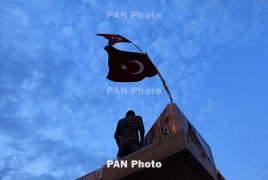Armenian Genocide raised at Turkey High Advisory Board meeting January 15, 2020 - 12:11 AMT PanARMENIAN.Net - The Armenian Genocide was discussed at a meeting of Turkey’s High Advisory Board presided over by President Recep Tayyip Erdogan on Tuesday, January 14, Anadolu Agency reports. The country’s communications director Fahrettin Altun said “some circles” are seeking to use the issue “to create divisions within the Turkish community” and “damage the harmony of the Turkish people.” April 24, 1915 is the day when a group of Armenian intellectuals were rounded up and assassinated in Constantinople by the Ottoman government. On April 24, Armenians worldwide will be commemorating the 105th anniversary of the Genocide which continued until 1923. Some three dozen countries, hundreds of local government bodies and international organizations have so far recognized the killings of 1.5 million Armenians as Genocide. Turkey denies to this day.  The Armenian Genocide The Armenian Genocide (1915-23) was the deliberate and systematic destruction of the Armenian population of the Ottoman Empire during and just after World War I. It was characterized by massacres and deportations, involving forced marches under conditions designed to lead to the death of the deportees, with the total number of deaths reaching 1.5 million. The foreign ministers of Armenia and Azerbaijan, Ararat Mirzoyan and Jeyhun Bayramov, have arrived in Washington. The CSTO budget for the current year requires adjustments due to the refusal of Yerevan to pay their share of contributions. Six total incidents have burned 19 old-growth trees. Friday night 8 trees were torched along the beautiful main entrance. The EU does not intend to conduct military exercises with Armenia, Lead Spokesperson for EU Foreign Affairs and Security Policy Peter Stano says. Partner news |